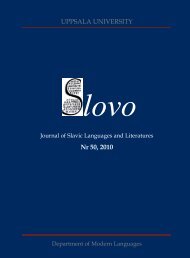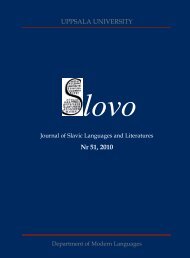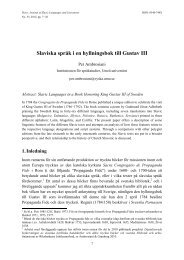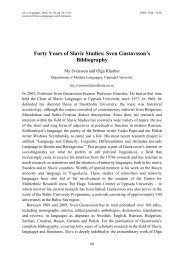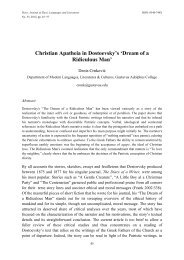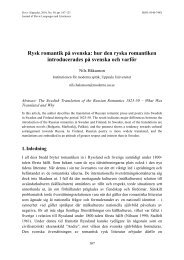Full text PDF - Index of - Uppsala universitet
Full text PDF - Index of - Uppsala universitet
Full text PDF - Index of - Uppsala universitet
You also want an ePaper? Increase the reach of your titles
YUMPU automatically turns print PDFs into web optimized ePapers that Google loves.
Slovo.<br />
Journal <strong>of</strong> Slavic Languages and Literatures<br />
PAST used to take whom … considered<br />
ip up (up) up<br />
|_____|______|____________|<br />
Figure 3. Feature transmission from “used to” to embedded adjunct.<br />
There is a puzzling fact about the English “used to” construction which is strictly<br />
speaking orthogonal to the argument proposed in this paper, but which nevertheless<br />
deserves mention in connection with SOT phenomena. It is well known that “used to”<br />
is restricted to the past tense (*John uses to...), but, more surprisingly the construction<br />
is obligatorily backward shifted when it occurs in complements under attitudes (Boneh<br />
& Doron 2010):<br />
(12) И вдруг ему вспомнилось, как они детьми вместе ложились спать. (Lev<br />
Tolstoj, “Anna Karenina”)<br />
(13) And suddenly he recalled how they used to go to bed together as children.<br />
(14) Og plutselig sto det for ham i minnet hvordan de som barn hadde gått til sengs<br />
sammen. (Norwegian)<br />
Even without the temporal modifier “as children”, the English construction must be<br />
backward shifted: the embedded habit cannot be simultaneous with the matrix verb as<br />
one would expect in a standard SOT construction. 5<br />
In this respect, “used to” is different from “normal” past habitual quantifiers such as<br />
pflegte/pleide å in German/Norwegian, which can either be shifted (by a local PAST<br />
operator) or be simultaneous with a past matrix (SOT). To complete the picture we<br />
note that “used to” is not necessarily backward shifted in adjuncts, cf. the English<br />
relative clause in (16):<br />
(15) Стихи, которые я писал, — плохие стихи, и я теперь это понял. (Bulgakov,<br />
“Master i Margarita”)<br />
(16) The poems I used to write were bad poems, and now I understand it.<br />
In this case the habitus <strong>of</strong> writing poems does not precede the state <strong>of</strong> the poems being<br />
bad. The habitus is simultaneous with that state. This is as expected on the view that<br />
the highest tense in adjuncts (here: “used to write”) is anaphoric to the matrix (here:<br />
“were”). The same non-shifted reading is also seen in the anaphoric use in (18), where<br />
the reference time <strong>of</strong> “used to” is anaphoric to the narrative “now” in the preceding<br />
sentence.<br />
(17) Он был женат и имел сына, но с женой разошелся, так как она ему<br />
изменила, и теперь он ее ненавидел и высылал ей ежемесячно по сорока<br />
рублей на содержание сына. (Anton Čechov, “Dušečka”)<br />
5<br />
The shifted interpretation <strong>of</strong> the complement is in the Norwegian translation conveyed by the time shifter<br />
“hadde” (= “had”).<br />
68



